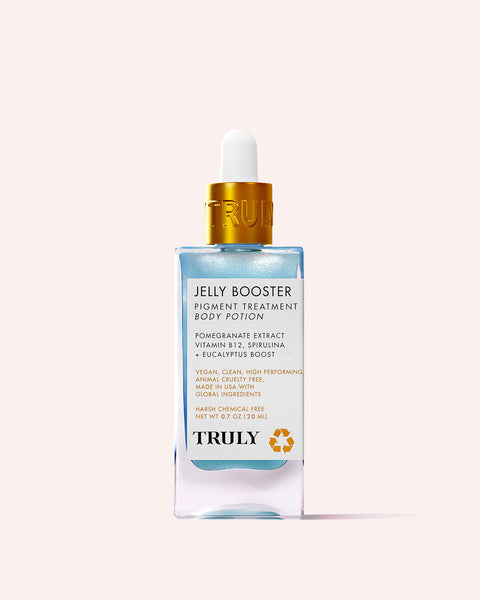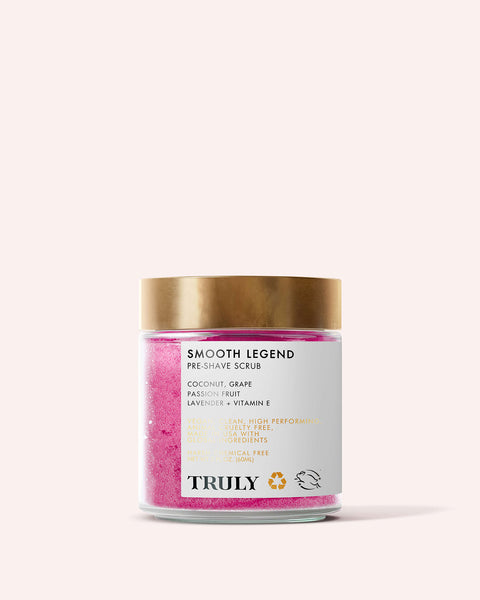How Blue Light Is Aging You (And How to Stop it)

Blue light is a new form of pollution that needs to be treated just as seriously as sun exposure.
If you want to prevent premature aging, dermatologists say UVA and UVB ray protection is no longer enough. According to research, blue light is just as bad for our skin.
In case you haven't heard, blue light is emitted from both the sun and your digital devices. It's responsible for causing everything from fine lines and wrinkles to hyperpigmentation. Yep, it's pretty serious, guys.
Here's everything you should know about blue light, how it's secretly aging you, and what to do about it!
What is Blue Light?
Blue light is high-energy visible light (HEV light) emitted by the sun, computer screens, smartphones, and even LED lighting. It is a portion of the visible light spectrum (380 to 500 nanometers) that is contained in sunlight, but it is also emitted by common electronic devices.
Blue light poses potential skin harm via free radical generation, as it has been shown in studies to induce oxidative stress in skin. As a result, blue light can contribute to premature skin aging.
Scarily, blue light may even be worse than the likes of UVA and UVB rays because it has the ability to penetrate deeper into the skin and penetrate all the way into the dermis, where collagen and elastin reside.
How Blue Light is Aging Your Skin
Blue light has caused a skincare phenomenon known as digital aging. In recent years, scientists have discovered just how harmful blue light is on the skin's natural repair processes. And with more of us spending more time on our electronic devices, it was bound to become a serious problem sooner or later.
In addition to breaking down collagen and elastin, triggering signs of aging like fine lines and wrinkles, blue light may also be causing pigmentation.
"Studies indicate that visible light may also be more active in inducing pigmentation compared to UV light," says dermatologist Dr. Stefanie Williams.
Blue light also compromises sleep by way of disrupting your natural circadian rhythm.
According to Williams, "If exposed to significant amounts of blue light at night for example, you may find it more difficult to fall asleep." This is because, as she says, blue light affects the level of melatonin. And as you know, lacking sleep isn't exactly a remedy for maintaining youthful skin. Rather the opposite in fact!
And just to put the icing on the cake, blue light rays may also be causing eye strain. If your eyes are glued to your screens for hours on end, you may be actively causing degeneration of your sight. That's why people are turning to blue light glasses and blue light protection screens to counteract the issue.
Blue Light Exposure is a Serious Issue
How often do you check your phone? If you're anything like the average millennial, it's bound to be around 150 times a day, according to a 2019 report. Millennials are said to spend an average of three hours and 15 minutes on their phones every day. The study adds that 20 percent of smartphone users have daily screen time in excess of four and a half hours.
But it's not just millennials suffering the effects of blue light exposure. Anyone who works on a laptop or spends a lot of time on their iPad is also at risk of experiencing blue light damage.
How to Protect Yourself from Blue Light Photoaging
First off, make sure you're wearing a broad spectrum sunscreen with an SPF of at least 30 every single day. This will shield your skin from the damaging effects of ultraviolet rays (UV rays), and keep your skin youthful for longer.
Next, load up on antioxidant-packed skincare products. From your cleanser to your moisturizer, your skincare routine should be jammed full of skin-friendly products designed to treat and prevent blue light damage.
Vitamin C and E are some of the best antioxidants out there. Try to find them in topical formulas and use daily. Wear them under your sunscreen to protect yourself from skin damage, such as dark spots, fine lines, and wrinkles.
Alongside this, try to cut down on your screen time. We know it can be tough if you work online, but it is possible to cut down screen time with a few tweaks. For instance, instead of scrolling Insta on your phone every morning and night, switch to a wellness practice like yoga or meditation. You're actively healing your mind and body -- and your eyes and skin! Win-win-win-win! And make sure you use a night mode blue light filter on your devices to save your eyes and skin!
Best Skincare Products for Blue Light
Address and slow down the aging process with these blue light-shielding skincare products. Your skin cells will thank you!
Blueberry Kush Bundle

A 4-step face + body kit designed to moisturize, illuminate, and protect your skin from blue light damage. The bundle features a facial oil, body lotion, body oil, and scrub, all made with the same formula: vegan collagen, AHA/BHAs, coconut oil, CBD, and 1,000 blueberries.
Blueberry necta plays a key role in shielding skin against blue light. This powerful antioxidant protect from photoaging caused by blue light exposure. Packed with fatty acids, it also supports skin barrier function, resulting in hydrated, glowing skin.
To get the most out of these products, incorporate them into your daily skincare routine.
Face and Boobies Night Routine

If you're exposed to multiple sources of blue light on a daily basis, repair existing damage and prevent more damage from occurring with our revitalizing nightime routine.
Featuring sleep masks and polish, this trio uses ingredients like retinol, vitamin C, collagen, and hyaluronic acid to tighten, resurface, and moisturize skin on the face, neck, and cleavage.
Whether or not you realize it, you are being exposed to blue light each and every day. From your digital devices to your LED light bulbs, blue light is casting its skin-damaging wavelengths on your skin all the time, leaving you vulnerable to issues like fine lines, wrinkles, and discoloration.
While blue light isn't associated with skin cancer, it can still cause damage to your skin, sight, and sleep patterns.
























































